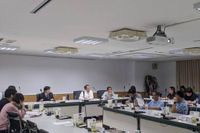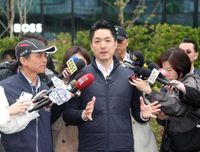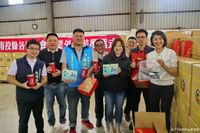In a bold move that has sent shockwaves through Taiwan's economy, U.S. President Donald Trump announced the imposition of "equal tariffs" on countries worldwide, with Taiwan facing rates as high as 32%. This decision has raised significant concerns among local industries, particularly in Nantou County, where traditional sectors such as agriculture and machinery are expected to bear the brunt of these tariffs.
Legislator Ma Wen-chun has been vocal about the potential ramifications of these tariffs, stating that they could severely impact Taiwan's traditional industries, including machinery and agriculture. In an effort to quantify the damage, Ma has initiated a preliminary assessment of the tool machine, machinery, and agricultural sectors in Nantou, urging the Executive Yuan to not only announce a NT$88 billion support package but also to devise specific strategies for assistance.
According to Ma, the United States is Taiwan's second-largest export market for tool machines, with exports valued at approximately $341 million, which makes up 15.4% of Taiwan's total exports. Furthermore, key components exported to the U.S. represent around 7% of the total export volume. This highlights the critical role that the U.S. market plays in Taiwan's economy, particularly for small and medium-sized enterprises (SMEs) in Nantou, which has become a hub for precision machinery.
Companies like Taiwan Yin Hing Co., Ltd. and Yuh Hing Machinery Industry have established their production bases in Nantou, and they are now bracing for the effects of the increased tariffs. Ma emphasized the need to work closely with local businesses to gather feedback and provide necessary support as they navigate these challenging times.
In addition to the machinery sector, Taiwan's agricultural exports to the U.S. are also significant, amounting to about $89 million, which accounts for 18% of total agricultural exports and 5% of the overall agricultural output value. Nantou, known for its agricultural products such as tea leaves, ginger, coffee, and flowers, has been actively pursuing international markets, especially post-COVID-19. However, the new tariffs threaten to disrupt these efforts.
Ma Wen-chun has called for collaboration between the government and the private sector to identify affected agricultural products and assist farmers in mitigating the impact of the tariffs. The Executive Yuan's plan to allocate NT$18 billion to support agriculture, particularly for products exported to the U.S., has been met with cautious optimism, though concerns remain about the adequacy of these measures.
Meanwhile, Taipei Mayor Chiang Wan-an has also taken action in response to the tariff crisis. During a recent municipal administration meeting, he outlined five strategies aimed at supporting local enterprises facing potential layoffs and rotational leave due to the tariffs. Chiang stressed the importance of ensuring that SMEs do not find themselves in a situation where they can "see but not eat" when it comes to available assistance.
The strategies proposed by Chiang include establishing a platform to integrate the needs and opinions of SMEs, providing financial assistance, and offering guidance for digital transformation and net-zero carbon emission initiatives. The Labor Bureau will also implement support plans for vulnerable labor groups, addressing the threat of unpaid leave and mass layoffs.
Furthermore, Chiang's administration plans to assist businesses in expanding into diversified markets by enhancing overseas exhibition subsidies and reducing application restrictions. He suggested organizing U.S. commodity exhibitions to expand procurement from the U.S. and strengthen negotiation positions for Taiwanese companies.
In a related development, the Taoyuan City Government is proactively addressing the high tariffs by organizing a seminar on April 10, 2025, to discuss the impact of the tariffs and potential supply chain adjustments. This seminar will be hosted by Mayor Chang San-cheng and will feature key officials from Hsinchu County and Miaoli County.
The Economic Development Bureau has noted that the Taoyuan, Hsinchu, and Miaoli regions are particularly vulnerable to the tariff impacts, given their roles in the technology corridor. The seminar aims to facilitate face-to-face exchanges between industry representatives and government officials to gather insights and suggestions for navigating the tariff landscape.
As the U.S. tariffs loom, local governments and industry leaders in Taiwan are scrambling to find solutions and support mechanisms for affected sectors. The urgency of the situation is palpable, and there is a collective hope that through collaboration and strategic planning, Taiwanese industries can weather this storm.
In the face of these unprecedented challenges, both the government and businesses are being called upon to work together more closely than ever before. The outcome of negotiations between Taiwan and the U.S. could determine the future of many sectors within the Taiwanese economy. The focus now is on unity and proactive measures to ensure that the impact of the tariffs is minimized and that Taiwan's economic resilience is maintained.







